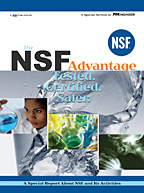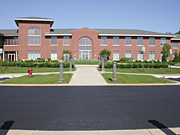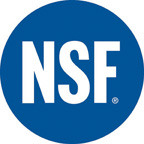
Issue: 6/05
In 2004, NSF International celebrated its 60th anniversary as the premier Public Health and Safety Company. What started out as the vision of three professors in the University of Michigan's School of Public Health to improve food and water safety for U.S. consumers is now a worldwide organization serving the water, food, and many other industries with operations in more than 80 countries.

The Food Equipment certification program is NSF's oldest offering, developed following the creation and approval of NSF flagship restaurant-industry standards in 1944. Today, there are over 100,000 products that NSF certifies to one or more of the 22 NSF food equipment standards in existence. The NSF Certification Mark on a food equipment product demonstrates that NSF has assessed-and certified-the product's conformity with the relevant NSF/ANSI standard, which includes successful completion of annual production facility audits.
NSF also participates in the arena of new water technology development and verification by working on behalf of the U.S. EPA to administer the Environmental Technology Verification (ETV) program to test and verify the performance and safety of advanced water treatment and protective technologies.
The markets for water treatment and delivery technology are becoming increasingly complex. Water treatment and technology providers are responding to the market demands by developing increasingly more effective-albeit more complex-technologies at a very rapid rate. Furthermore, manufacturing globalization is bringing more and more manufacturers and technology providers into North American markets. In this environment, the value of certification to plumbing engineers and code officials is clear. While it is not possible for plumbing engineers and code officials to stay abreast of all of the changes in technology and product requirements, they can easily and effectively accomplish this task simply by looking for the NSF Mark.

But NSF is more than a testing lab, and it takes more than passing a one-time laboratory test to earn an NSF Mark. In order to maintain certification, companies must pass on-site, unannounced inspections at each of their manufacturing facilities that make an NSF-listed product. Manufacturing processes and product formulations are verified to assure that the products coming off the manufacturing line today meet the same high standards as the product(s) originally certified.
NSF's auditors visit thousands of facilities in more than 80 countries around the world to verify formulations, sources of raw materials, manufacturing processes, quality programs, as well as collect samples of certified products for annual and periodic retesting. Manufacturers with processes or products found to be non-compliant are ordered to cease using the NSF Mark on their products and take corrective action to restore the quality and effectiveness of their product or risk losing their certification.
NSF maintains certification programs to hundreds of standards. All of these certification programs are fundamental to the markets they serve, but several NSF standards and certification programs are more recognized and have a greater impact in the plumbing trades.

NSF/ANSI Standard 61 ensures that pipes, fittings, valves and other components and devices do not contribute harmful levels of contaminants to drinking water. In fact, NSF 61 covers every material that contacts water, from the water utility's source water intakes to the faucet in your home.
NSF also maintains numerous other standards and certification programs to offer complete coverage of water treatment, distribution and delivery of drinking and wastewater, including such standards as NSF/ANSI Standard 24, which applies to drinking water components in recreational vehicles, and NSF/ANSI Standards 42 and 53 for drinking water treatment units used to treat water at the Point of Entry (e.g., whole-home water softeners or treatment/filtration units) or Point of Use (e.g., under-the-sink or faucet-mounted treatment and filtration products), designed to remove harmful contaminants, chlorine or nuisance taste and odor compounds. One of NSF's newest standards, NSF/ANSI Standard 177, applies to shower filtration units and responds to the growing concern over chlorine-based compounds and other contaminants and the demand for verifiable safe, effective, and certified shower water treatment options.
NSF International continues to develop and stay at the forefront in the effort to provide safer drinking water to people throughout the world. And as the demand for safe and effective treatment options for drinking water around the world continues to grow, so will NSF International.